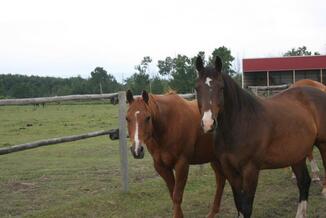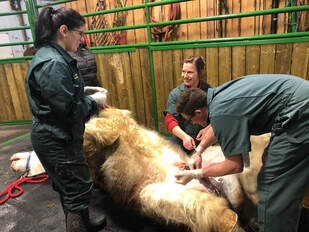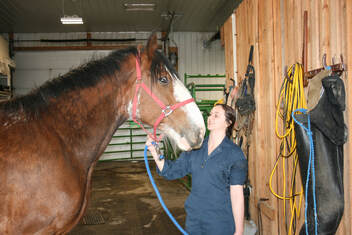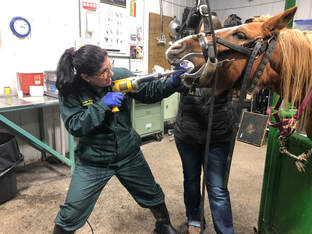|
We provide a wide range of services for our equine patients. We are committed to first class care of our equine companions. We support a wide range of equine athletes and strive to help them compete successfully and safely. Our veterinarians work with you to come up with a plan to keep your horse in good health. Below is a breakdown of the services we are here to provide.
|
Need more information? Our team is happy to answer your questions! Call or email us: 250-782-1080 or [email protected] |
preventative health care
Our veterinarians work with you to come up with a plan to keep your horse in good health. We will review your horse's needs and risks and set up a vaccination plan to protect your horse against diseases that could seriously affect their health or their ability to compete. We can also review your pasture management and perform fecal exams to determine an appropriate deworming program. We will also go over dental care, weight management, joint health and other areas that may affect the overall health of our equine patients.
equine medical services
Our caring staff will take their time in examining all unwell or injured animals. Our hospital is equipped for treatment and the hospitalization of your horse. We care deeply about their comfort and your concern for their wellbeing. Our equipment, including an in house blood analyzer, digital x-ray, endoscope and ultrasound machines, allow for quality patient care.
equine surgical services
We take pride in both the range and the quality of surgical services provided. We perform routine surgeries such as castrations and caslick sutures. Our vets and assistants work as a brilliant team and patients are monitored during the entire surgical procedure as well as during their recovery. We also offer more advanced surgeries including palmer digital neurectomy, urogenital surgeries (such as bladder stone removal), corrective hoof resection, cryptorchid castrations, hernia repairs and more. We have a blood analyzer in clinic so you have the option of having bloodwork done on your horse prior to surgery to check their general health and the health of their kidneys and liver. We have a patient warming system that will help foals stay warm and comfortable during a procedure. Our veterinarians and our support staff attend continuing education and we do in clinic training to ensure we are current and up to date in our procedures. All of these factors minimize the risks that may be involved with anesthesia and surgery.
equine dental services
Regular dentals play a major role in maintaining the health of your horse. Sharp tooth edges may cause sores in the mouth, leading to discomfort, training difficulties and reduced efficiency in obtaining nutrients from the feed. Timely dentals will keep your horse's mouth balanced, resulting in improved health, performance and efficiency. More serious dental issues such as tooth root infections, sinus infections and fractured teeth may also require veterinary care. Our large animal veterinarians have taken additional training in equine dentistry and regularly attend the American Association of Equine Practitioners annual conference where there is up to date training and information on equine dentistry. The clinic also gets a subscription to the Journal of Equine Dentistry which also contains current information. Our veterinarians perform dental exams on over 700 horses a year. Both Dr. Mike Ross and Dr. Christa Harder are very interested in equine dentistry and have performed advanced equine dental procedures.
equine laser therapy
We are very proud to offer laser treatment at Dawson Creek Veterinary Clinic. Laser therapy is a specific class of laser beam that is used to treat a patient for an injury or inflammation. Depending upon what we are treating, we usually will do a series of 6 treatments. All patients will respond differently but if we use this to treat a chronic condition like arthritis, we may need to do a follow up series in 6 months' time. Generally there will be 3 sessions in the first week, 2 sessions in the second week and 1 session in the third week but this will vary from case to case. Some cases may require more routine maintenance such as weekly therapy. Laser therapy is a non-surgical treatment that requires no sedation. There are no side effects and you will be able to see rapid results in your pet and their healing process. Laser therapy helps treat arthritis, acute and chronic pain, back injuries, tendon and ligament injuries, swelling, inflammation and wounds. It is alternative or adjunctive to pharmaceutical pain management.
equine diagnostic services
While a thorough physical exam and getting a good history from our clients can sometimes be enough for a vet to figure out what is bothering your horse, getting to the bottom of a disease or problem with your horse can often be challenging. We have some valuable tools that can help our veterinarians to diagnose what is wrong with your horse, which will then allow them to work with you to come up with a plan to treat your horse and give your horse the quality of life it deserves. We have an assortment of tools including an endoscope, ultrasound machine, x-ray machine and an in house blood analyzer.Our x-ray machine is a CR (Computed Radiography) unit which allows us to take an x-ray and develop it into a computer image. This allows us to adjust the image, email it to specialists, and compare it with other images.Our ultrasound machine has three different probes allowing for us to use it on multiples species of animals and on various areas of the body. While X-rays can often only identify problems with bones, ultrasound can be used to examine soft tissues. We commonly use it to examine tendons and ligaments in your horse's leg. We can also diagnose pregnancies with it or evaluate your horse's reproductive tract. Our endoscope is a small camera that can be used to look in your horse's nose and throat area and can be used to diagnose guttural pouch infections, dorsal displacement of soft palates and laryngeal problems. We can also use the ultrasound machine and endoscope to evaluate your horse's urinary tract. Our in house blood analyzer allows us to do a variety of common blood testing procedures including checking red blood cell counts, white blood cell counts, clotting times, electrolyte levels, and various other blood chemistries
equine reproductive services
Artificial insemination in horses can be relatively simple or quite complicated depending upon the mare, the type of semen used (fresh, frozen or chilled) and where the semen is coming from. There are additional tests that can be done prior to breeding which will help us determine whether mares are good candidates for breeding and if any additional treatment will be needed. These tests include ultrasound exams of the reproductive tract, uterine swabs and uterine biopsies. Artificial insemination can be safer for both the mare and stallion and can minimize the number of times a mare is bred and the degree of contamination of her uterus which can interfere with conception. Fresh semen is the best and conception rates can be well over 75 or 80% with fresh semen.
Equine pre purchase, Lameness & joint health exams
Our veterinarians can perform pre purchase exams prior to you buying a new horse. We will evaluate the animal's personality, conformation and general health and look for any areas of unsoundness.
Our large animal veterinarians also have training in how to evaluate lameness in horses. We use a number of tools and tests including observation of a horse on a variety of footing and in a variety of gaits to identify the lame leg. We then can perform flexion tests, local nerve blocks, ultrasound, and xrays to determine what the problem might be. We then work with you to come up with a plan for appropriate treatment. We also have a number of products and procedures which can help with joint health including the ability to do intra-articular injections. We carry Legend' and Adequan' as well as other products including Back on Track, glucosamine, supplements and liniments.
Our large animal veterinarians also have training in how to evaluate lameness in horses. We use a number of tools and tests including observation of a horse on a variety of footing and in a variety of gaits to identify the lame leg. We then can perform flexion tests, local nerve blocks, ultrasound, and xrays to determine what the problem might be. We then work with you to come up with a plan for appropriate treatment. We also have a number of products and procedures which can help with joint health including the ability to do intra-articular injections. We carry Legend' and Adequan' as well as other products including Back on Track, glucosamine, supplements and liniments.




